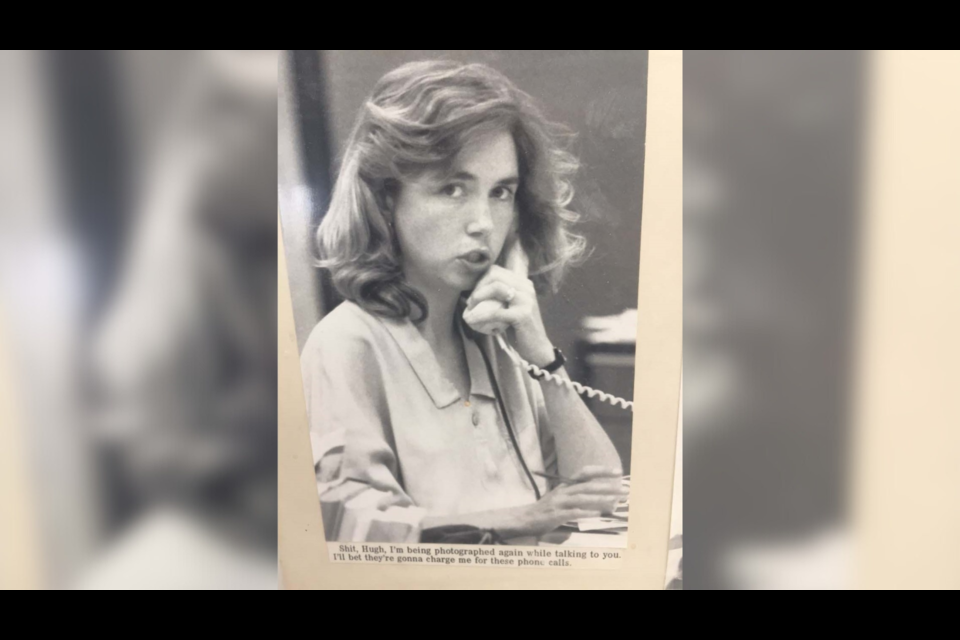So here it is, my swan song — for now.
As of tomorrow, I’ll be taking a one-year leave to teach at Kwantlen Polytechnic University. For the past couple of years, I’ve been teaching one class a semester in the journalism/communication department. It’s been a great opportunity to gather my thoughts on this industry that I’ve been toiling in for the past 30 years — OMG, it’s been that long.
Back in my early 20s, I never would have thought I’d have a career in journalism. I found writing stressful and could never figure out where a comma went.
That said, perhaps there were some early warning signs of what was to be. As a kid, Harriet the Spy was my favourite novel and Mary Tyler Moore my favourite TV show – both feature journalists. (Okay, Harriet is a spy but when her snoopy nature gets her into trouble, a kindly counsellor guides her into reporting for the school newspaper.)
Like Harriet, my entry into journalism was through a side door. I began by writing an arts column and theatre reviews, gravitating towards features, then finally jumping into news.
Perhaps it’s because of that circuitous route I often felt like an outsider in this business — and that’s a good thing. Particularly as an editor, it has reminded me that most of our readers are not journalists. They’re people from all walks of life, and those are the folks (you) we need to write for and whose voices we need to hear.
Creating that common space for diverse views based on facts is more important than ever.
The internet is an amazing tool. We couldn’t do our jobs without it, and its ability to connect people from around the world over the most obscure of topics is a feat.
But those algorithms that push content based on our searches have also created online spaces where news is filtered to only confirm our biases. An increase in polarization and a decrease in democracy around the world should be no surprise.
Democracy requires that we speak beyond our clan and base our decisions not on circular narratives but on new facts as they arise. And where do we get those facts?
In my class last semester, I asked students every week to bring in an interesting news story. One week a student brought in a story about a school board in Tennessee “quietly” banning the children’s book, Maus. The student was horrified. As a kid, he had loved this Pulitzer Prize winning graphic novel that addresses the issue of antisemitism through a boy interviewing his father who had lived through the Holocaust in Poland.
As a journalism instructor, the interesting thing for me about this news story was the word “quietly.” What made this school board decision, which we’re only hearing about weeks after the fact, so quiet? Did it happen under cover of night? Not at all, the vote happened at an open public meeting, but there was no journalist there to report on it.
The school board’s decision eventually did come out, and the news media jumped all over it, but it makes me wonder how many other books have disappeared from library shelves.
News is a food chain and without local reporters on the ground in the community connecting, digging, or just showing up, the system will feed on itself; instead of news, we have polarized narratives.
Richmond is not Tennessee, but we’ve had our share of stories that have lit a fire under residents and only happened because we happened to be at a particular zoning meeting, court hearing or council debate.
We have structures and institutions to safeguard democracy, things like an open court and public council meetings, but if we don’t take advantage of those rights by having the eyes of the public there, they’re of little use.
It has been a privilege to have this platform to write a column. Of all my duties, it’s the one thing that makes me most feel like an editor.
But this column could only happen because of our reporters. I didn’t go to a purple-ribbon rally last Friday, our reporter did. I haven’t interviewed city councillors about densifying single-family neighbourhoods, our reporter did. But because they did, I can rant.
As I head off on this hiatus, I want to say thanks to our publisher for allowing me this space, thanks to our reporters for providing the fodder for it and thanks to you for reading — not just this column but local news in general. It is no understatement to say our democracy depends on it.
BTW, I still find writing stressful, but I know where the comma goes — usually.



